#foreign tax advisor
Explore tagged Tumblr posts
Text
#Corporate tax rate in India#income tax#union budget 2024#corporate tax services in uae#tax plannning#corporate tax planing#corporate tax rate in india ay 2024-25#income tax slab for ay 2024-25#corporate tax rate#corporate tax rate in India 2024#income tax department#Corporate tax rate in india ay 2024 25 pdf#income tax rate for pvt ltd company for ay 2024-25#Corporate tax rate in India for last 10 years#Current corporate tax slab rates for companies in India 2024#Understanding income tax obligations for Indian companies#How GST impacts corporate tax liabilities in India#List of corporate tax exemptions available for Indian businesses#Tax rates for foreign companies operating in India#tax advisor#online ca consultation service#professional tax consultant service
0 notes
Text
Unlocking Success: TaxDunia Proven Strategies for Foreign Company

Foreign Company Registration is the process of legally establishing a business entity in a country different from where it was originally incorporated. For businesses looking to expand internationally, this process allows them to operate and conduct business in a new market while complying with local laws and regulations.
The registration involves several steps, including choosing the right business structure (such as a subsidiary, branch office, or representative office), submitting necessary documents, and meeting legal requirements specific to the host country. This may include obtaining a local business license, registering with tax authorities, and adhering to local labor and corporate laws.
Successful foreign company registration can open up new opportunities, facilitate market entry, and help businesses gain a competitive edge. It’s essential to seek local legal and financial advice to navigate the complexities of the registration process and ensure compliance with all regulations in the new market.
India’s diverse business landscape and evolving regulatory environment can present unique challenges for international enterprises looking to establish a foothold in this dynamic market. However, with the right guidance and strategic approach, foreign companies can navigate these waters and unlock tremendous growth opportunities. Whether you’re a multinational corporation or a small-to-medium-sized enterprise, our goal is to empower you with the knowledge and tools necessary to make informed decisions and achieve your business objectives in the Indian market.
Why Register a Foreign Company in India?
India’s rapidly growing economy, large consumer base, and pro-business policies have made it an increasingly attractive destination for foreign direct investment (FDI). By establishing a registered presence in India, foreign companies can:
1.Access a Vast and Diverse Market: With a population of over 1.3 billion and a rapidly expanding middle class, India offers unparalleled opportunities for businesses to reach a vast and diverse customer base.
2.Leverage Cost Advantages: India’s competitive labor costs, skilled workforce, and favorable manufacturing and service sector environments can provide significant cost advantages for foreign companies.
3.Capitalize on India’s Strategic Location: India’s strategic geographic location, well-developed transportation infrastructure, and proximity to other emerging markets make it an ideal hub for regional and global operations.
4.Benefit from Favorable Policies and Incentives: The Indian government has implemented various policies and incentives to attract foreign investment, including tax benefits, special economic zones, and streamlined regulatory processes.
5.Enhance Credibility and Visibility: Registering a foreign company in India can enhance the company’s credibility and visibility, making it more attractive to potential partners, customers, and investors.
Key Considerations for Foreign Company Registration in India
Before embarking on the foreign company registration in India, it’s crucial to consider the following key factors:
1.Legal Structure: Determine the appropriate legal structure for your foreign company in India, such as a wholly-owned subsidiary, joint venture, or liaison office.
2.Sector-Specific Regulations: Understand the specific regulations and requirements for your industry or sector, as some sectors may have additional compliance obligations.
3.Taxation and Accounting: Familiarize yourself with India’s complex tax system, including income tax, goods and services tax (GST), and other relevant regulations.
4.Repatriation of Profits: Understand the rules and procedures for repatriating profits from India to your home country.
5.Regulatory Approvals: Identify the necessary regulatory approvals and licenses required for your business operations in India.
6.Compliance and Reporting: Ensure that you have a robust system in place to maintain compliance with all applicable laws and regulations, including timely filing of returns and reports.
Step-by-Step Process for Foreign Company Registration in India
Navigating the foreign company registration process in India can be a complex and time-consuming endeavor. At TaxDunia, we have developed a structured approach to guide our clients through each step of the process:
1.Name Approval: Obtain approval for the proposed name of your foreign company from the Registrar of Companies (ROC).
2.Incorporation: Incorporate your foreign company in India as a private limited company or a wholly-owned subsidiary.
3.Regulatory Approvals: Obtain necessary approvals and licenses from relevant authorities, such as the Reserve Bank of India (RBI), the Ministry of Corporate Affairs (MCA), and industry-specific regulators.
4.Taxation and Compliance: Register your foreign company for various tax and compliance requirements, including income tax, GST, and labor laws.
5.Bank Account Establishment: Open a corporate bank account in India to facilitate business operations and financial transactions.
6.Ongoing Compliance: Maintain ongoing compliance with all applicable laws and regulations, including timely filing of returns, reports, and other required documents.
Throughout this process, our team of experts at TaxDunia will work closely with you to ensure a seamless and efficient registration experience.
Choosing the Right Income Tax Consultant in India
Navigating India’s complex tax landscape is a critical aspect of foreign company registration and operations. Engaging the services of a reliable and experienced income tax consultant can make all the difference in ensuring compliance, minimizing tax liabilities, and optimizing your company’s financial performance.
When selecting an income tax consultant in India, consider the following key factors:
1.Expertise and Experience: Look for a consultant with a proven track record of handling tax-related matters for foreign companies operating in India.
2.Regulatory Knowledge: Ensure that the consultant is well-versed in the latest tax laws, regulations, and compliance requirements.
3.Responsiveness and Communication: Choose a consultant who is responsive, communicative, and able to provide timely and accurate advice.
4.Service Offerings: Evaluate the consultant’s range of services, including tax planning, return filing, audit representation, and advisory support.
5.Reputation and Credentials: Check the consultant’s reputation, professional affiliations, and client testimonials to gauge their credibility.
Benefits of Working with the Best Income Tax Consultant in India
Engaging the services of the best income tax consultant in India, such as TaxDunia, can provide a multitude of benefits for foreign companies operating in the country:
1.Comprehensive Tax Expertise: Our team of seasoned tax professionals possesses in-depth knowledge of Indian tax laws, regulations, and best practices, ensuring that your company remains fully compliant.
2.Proactive Tax Planning: We work closely with you to develop customized tax planning strategies that minimize your tax liabilities and maximize your financial returns.
3.Streamlined Compliance: We handle all your tax-related compliance requirements, including timely filing of returns, managing audits, and representing you before tax authorities.
4.Cost Optimization: By leveraging our expertise and economies of scale, we can help you achieve significant cost savings on your tax-related expenses.
5.Reduced Risk: Our thorough understanding of the Indian tax landscape and our commitment to staying up-to-date with the latest changes in regulations help you avoid potential penalties and legal issues.
6.Improved Decision-Making: Our tax advisory services provide you with valuable insights and recommendations to support your strategic business decisions in India.
7.Enhanced Credibility: Working with a reputable and trusted income tax consultant like TaxDunia can enhance your company’s credibility and reputation in the Indian market.
At TaxDunia, we are committed to helping foreign companies navigate the complexities of registering and operating in India. Contact us today to learn more about our proven strategies and how we can support your success in the Indian market. Visit us at taxdunia.com to get started.
Conclusion: TaxDunia’s Expertise in Foreign Company Registration in India
At TaxDunia, we are committed to empowering foreign companies to unlock their full potential in the Indian market. Our deep understanding of the country’s regulatory environment, tax landscape, and best practices, coupled with our client-centric approach, make us the trusted partner of choice for businesses seeking to establish a successful presence in India.
Whether you’re a multinational corporation or a small-to-medium-sized enterprise, our team of experts is ready to guide you through every step of the foreign company registration process and beyond. From incorporating your business to optimizing your tax strategy and ensuring ongoing compliance, we will work with you every step of the way to tackle challenges, reduce risks, and make the most of the great opportunities available in the Indian market.
Take the first step towards your success in India. Contact https://www.taxdunia.com today to learn more about our proven strategies and how we can help you navigate the complex world of foreign company registration in India.
Other Link
Private Limited Company Registration
One Person Company Registration Service
Public Limited Company Registration Service
GST Return Filing Services
Trademark Registration service
#Foreign Company Registration in India#Top Income Tax Consultants#Best Income Tax Advisors#Tax Consultant Services#best income tax consultant in india#income tax#itr filling#itr filing#gst return#finance
0 notes
Text
UK Tax on Foreign Income | Specialist Tax Advisor Foreign Income
Do you need advice on UK Tax on Foreign Income? You can call our specialist international income tax accountants for advice & tax compliance.
0 notes
Text
Expert Tax Advisors in Dublin: Maximizing Your Financial Potential
Tax experts who can undertake your tax-related activities and you can concentrate on your main activities.take help from Tax Advisors Dublin, as they are experts in the field of taxation. They are well-versed in local, state, federal, and foreign tax laws and have a solid grasp of the rules. To know more : https://smartlink1.livejournal.com/650.html
0 notes
Text
April 14, Xi'an, China, Shaanxi History Museum, Qin and Han Dynasties Branch (Part 1 - Political Structure, Laws, and Military):
This was the final museum I went to while in Xi'an, and despite its name, it is not the Shaanxi History Museum/陕西历史博物馆. It is a new branch that's in a separate location from the main museum, so it's also referred to as the "Qin/Han Branch"/秦汉馆 (ugh I wish I could've gone to the main branch), and the museum building and its gates were supposed to imitate the look of Qin/Han-era palaces. It was raining cats and dogs the night before, so the ground still bear traces of that. I had fun though.

This museum doesn't have a lot of unique artifacts that other museums don't have, but instead focuses on the political structure, thought, life, and technologies from Qin and Han dynasties, so there were a lot of tables, maps, and diagrams in the museum. I will only be giving a brief summary of each thing here so these posts won't get too long (and take too much effort to make). If you understand Chinese though, these may be helpful worldbuilding references.
First is a rough timeline of the history Qin dynasty (221 - 207 BC) to Han dynasty (202 BC - 220 AD) (right side of timeline) and how it fits within the overall ancient world history (left side of timeline) in the same time frame, just as a general reference so museum visitors can have an idea of when these dynasties and events took place. The timeline included events starting from when Qin was still a state (Warring States period, 476 - 221 BC) until after the end of Han dynasty (Three Kingdoms period, 220 - 280 AD; and Western Jin dynasty, 265 - 317 AD). Here, 公元元年 means 1 CE/AD, so 公元前 means BCE/BC, and 公元 means CE/AD. Also I know the left side is hard to read, sorry about that, it was easier to read in person. There is a key at the bottom though:
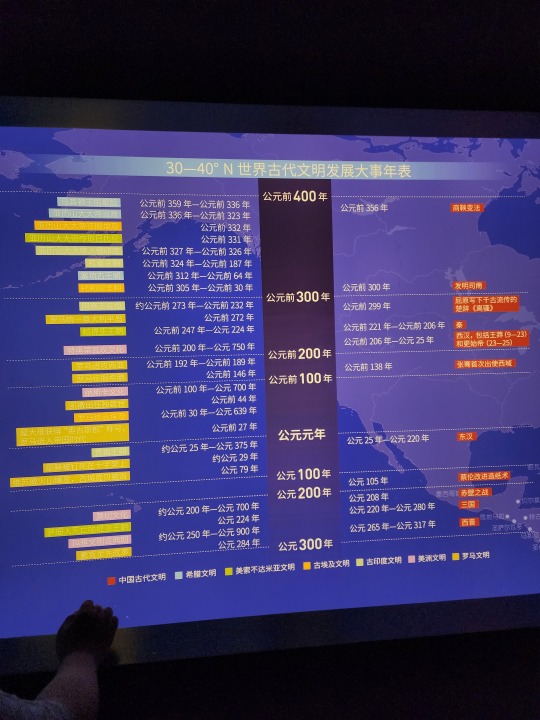
A diagram of the Three Lords and Nine Ministers system (三公九卿制) that was used as the central political structure of ancient China during Qin and Han dynasties, which was replaced by the Three Departments and Six Ministries system (三省六部制) in Sui dynasty (581 - 618 AD). There are many translations for the same positions, here I used what I think fits best for each position.
The Three Lords/三公 are (left to right on chart) : the Imperial Secretary/御史大夫 (handles the audit system and helps the chancellor), the Chancellor/丞相 (helps emperor handle national political affairs), and the Grand Commandant/太尉 (helps emperor handle military affairs).
The Nine Ministers/九卿 are (left to right): the Minister of Finance/治粟内史 (oversees public finance and tax system), the Minister of the Imperial Clan/宗正 (handles affairs within imperial clan), the Grand Herald/典客 (handles foreign policy), the Minister of the Guards/卫尉 (controls imperial guards), the Minister of Justice/廷尉 (oversees judicial system), the Minister of Attendants/郎中令 (controls palace guards, oversees imperial household, serves as imperial advisor, etc.), the Minister Coachman/太仆 (oversees the care, training, use, and purchase of horses; horses were an important resource in ancient times), the Lesser Treasurer/少府 (oversees the emperor's personal finances and some taxes), and the Minister of Ceremonies/奉常 (handles official ceremonies, worship, and rituals, oversees court astrologers and court scribes/historians).
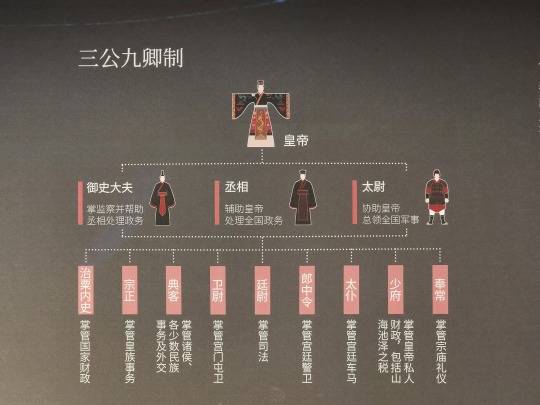
Qin and Han dynasty bureacratic systems. Right is Qin dynasty's system of commanderies/郡, counties/县, townships/乡, and villages/里 (levels of local government from highest to lowest). Left is Han dynasty's central government system, which designated the Three Lords and Nine Ministers system as the Outer Court/外朝 (executes policies), and added a Central Court/中朝 (decides policies).
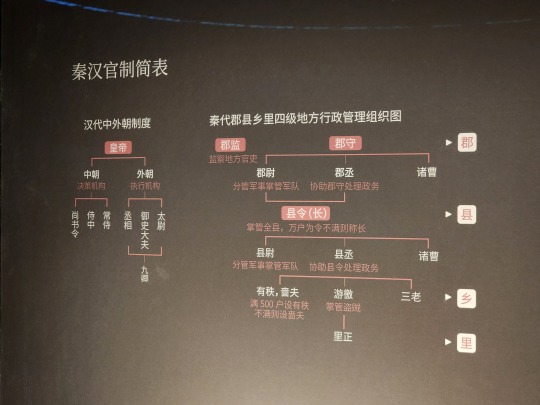
A list of the 48 commanderies during Qin dynasty and their locations today, grouped by where they were located before Qin dynasty (for example 7 of these groups were states during the Warring States period). A few of the names of these commanderies continue to be place names today, and some others often make appearances in modern novels.
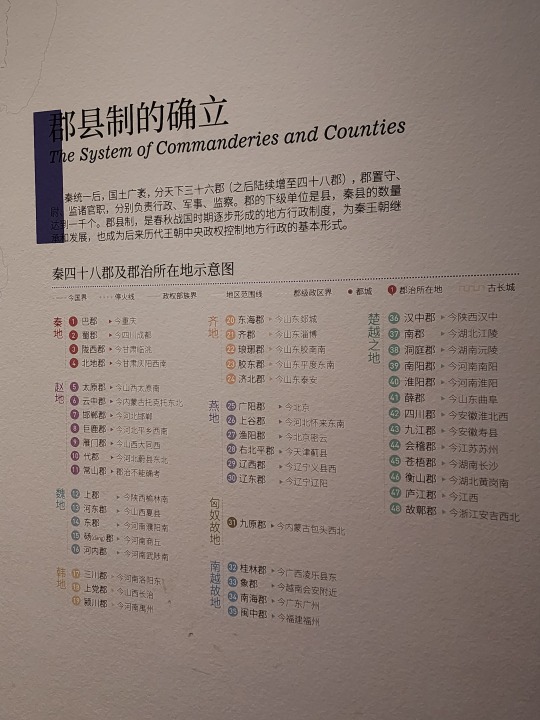
The Recommendatory System/察举制 of Han dynasty, which was how officials were selected. Basically this process consists of a few steps: first the emperor would set what categories of talents are needed, then local government would recommend people to the central government accordingly. The emperor would ask the recommendees how they would deal with current issues, and then gave them positions based on how good their policy ideas were. Ideally the local officials would be impartial with recommendations, but in reality the local officials often belonged to powerful local clans, so these recommendations gradually became a way for the powerful clans to stay in power. This system was replaced by the Imperial Examination System/科举制 in later dynasties, which put more emphasis on exams as a way to select talents.
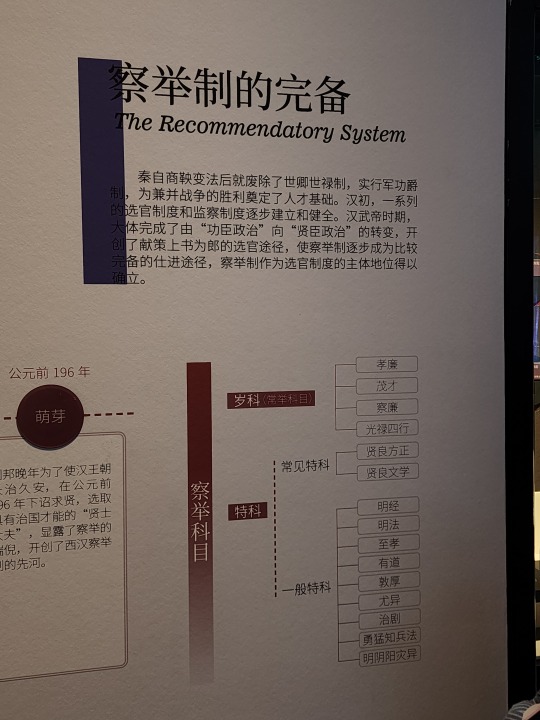
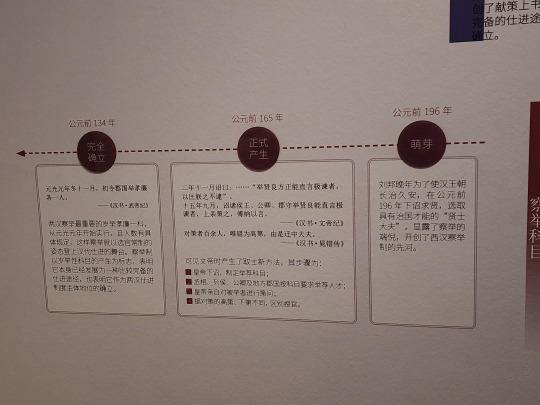
The locations of Qin and Han dynasty national temples, sacred mountains, and sacred bodies of water on a modern map. Of these, the temples marked in yellow were the temples dedicated to eight deities worshipped by the state of Qi, so they are collectively called the Eight Deities of Qi/齐地八神. Although the state of Qin eventually defeated the state of Qi, worship of these deities continued through Qin dynasty into Han dynasty. The temples marked in red were dedicated to deities worshipped by the state of Qin. The temples marked in purple were temples built in Han dynasty. The sacred waters are marked with wavy lines. The sacred mountains are marked in light blue-gray (a few are outside of this picture). MDZS fans may recognize Qishan/岐山 on this map, and Three Kingdoms enthusiasts may recognize jieshishan/碣石山 as the place Cao Cao visited when he wrote the line "东临碣石,以观沧海" in his famous poem.

Replicas of a small part of the Qin-era bamboo texts found in a tomb of a Qin dynasty official at Shuihudi (睡虎地秦简). The originals are at Hubei Provincial Museum/湖北省博物馆. Many of these texts concern laws and decrees of Qin dynasty, and in another tomb in the same area there were also the oldest letters ever found in China (link goes to the full digitized text). These bamboo slips are meant to read from top to bottom, right to left, and the construction of bamboo scrolls are actually the very reason why Chinese texts read this way traditionally even on printed texts during later dynasties.


This was something I'd written about in the MDZS posts a few years ago, and now I've finally seen the real thing with my own eyes: the Tiger Tally/虎符 (I translated it as "Tiger Amulet" in that post but in fact "Tally" is the correct translation). Tiger tallys have two halves, each with gilded gold text upon them. This particular artifact is the left half of a tiger tally from late Warring States period (state of Qin), and reads:
"This is a tally of the armed forces, right half goes to the ruler of Qin, left half goes to (the official of) Du county. When the need to dispatch armored troops of over 50 soldiers arises, this half must find the other half held by the ruler in order to authorize this military activity. In case of emergency, there is no need to wait for this authorization." (“兵甲之符,右才君,左才杜。凡兴士披甲用兵五十人以上,必会君符,乃敢行之。燔燧之事,虽毋会符,行殹。”)


The different currencies (coins) of the states of Warring States period:

The different coins and coin molds during Qin and Han dynasties:
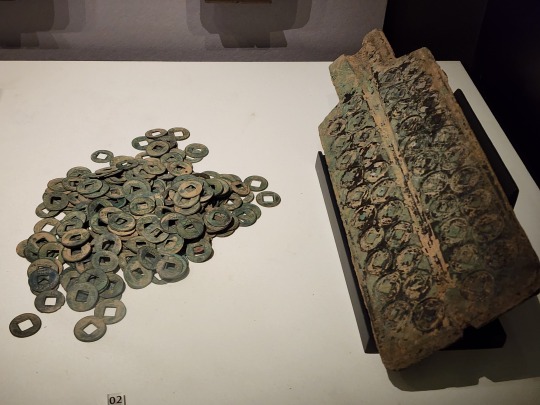
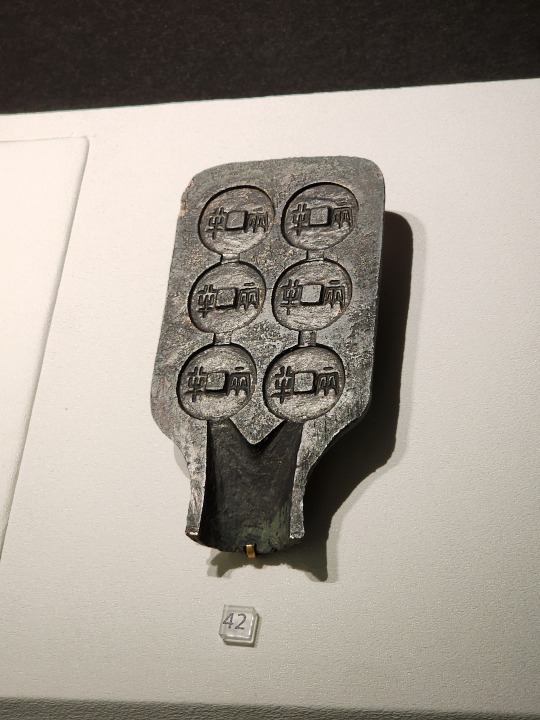

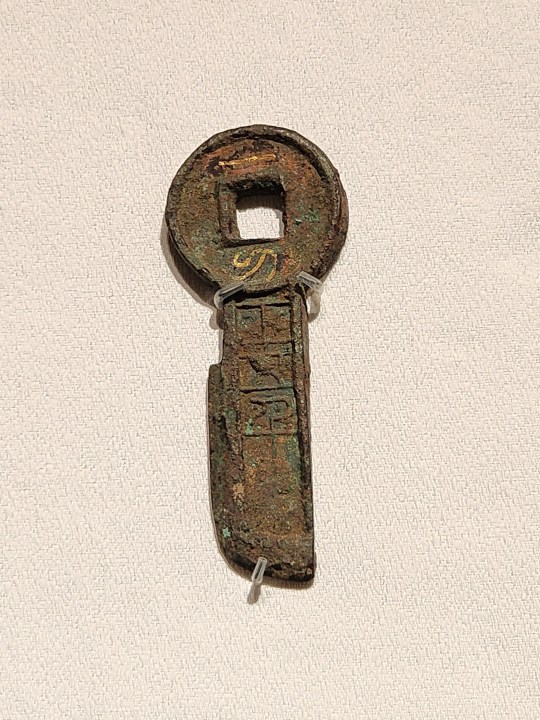
Left: Han dynasty disk-shaped gold ingots; these were rare currencies at the time and were mainly exchanged between the imperial family and nobility as gifts. Right: a standard weight from Qin dynasty that reads "weighs 30 jin/斤". Since Qin dynasty unified systems of measurements, and this weight is known to weigh 7.5 kg, we can easily convert the Qin-era jin to the modern kg (1 Qin-era jin = 0.25 kg).

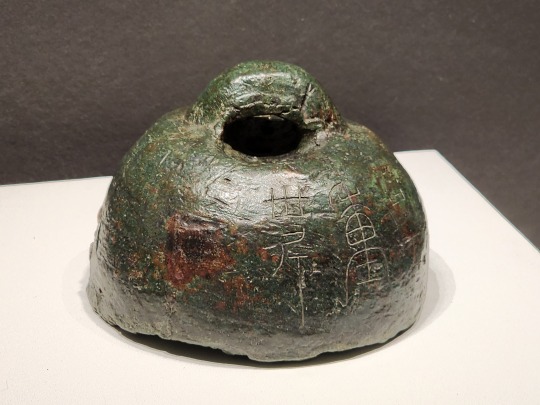
Terra cotta soldier and horse from Qin Shihuang's mausoleum. As some people have pointed out, these terra cotta soldiers were fully painted and colorful when they were first excavated, but when exposed to air, the paint quickly peeled and the colors faded, leaving the sculptures in their familiar clay-color. Few of these sculptures still have their original colors intact, thanks to preservation efforts. The immense difficulty of preservation is also a reason why modern Chinese archaeology has that rule of "don't excavate unless absolutely necessary".
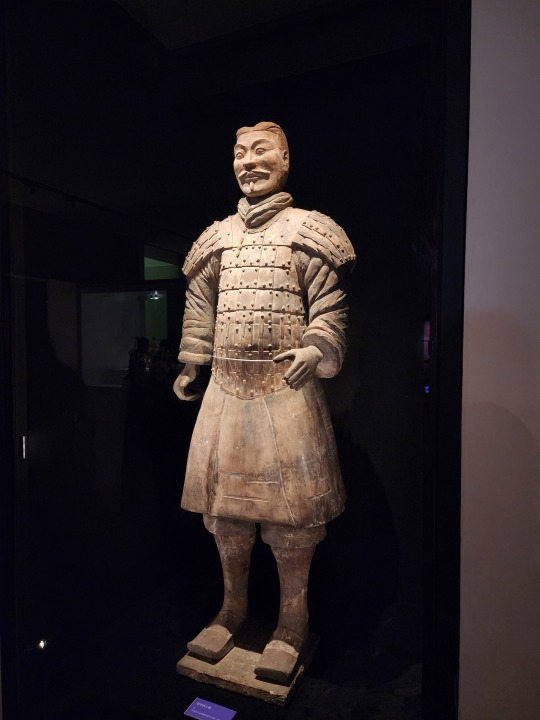
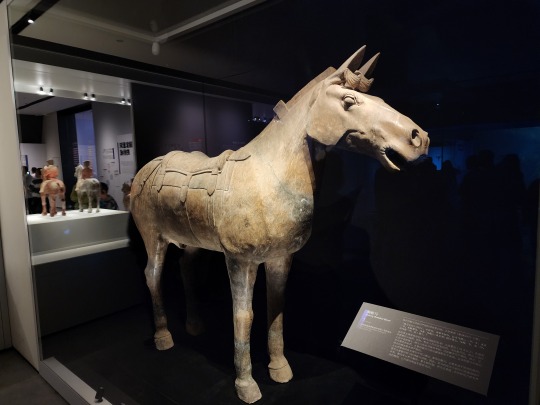
A Qin-era bronze jian/剑 (double-edged straight sword) from Qin Shihuang's mausoleum:

Left: Qin-era bronze spear heads and a pi/铍 head (on the right; pi is a type of ancient Chinese polearm). Right: Han-era ring-pommel dao/环首刀 (dao is a single-edged sword that can be straight or curved; interestingly, many ring-pommel dao artifacts exhibit a forward curve). Ring-pommel dao continued to be used in the military after Han dynasty.
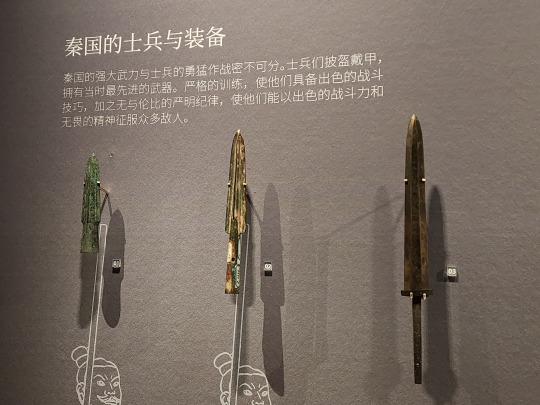

A suit of armor made out of stone from Qin Shihuang's mausoleum. These armor sets weigh about 18 kg or 39.7 lbs each, which is........actually not too bad. There are specialized armor sets in later dynasties that can weigh 30 kg or 66 lbs.
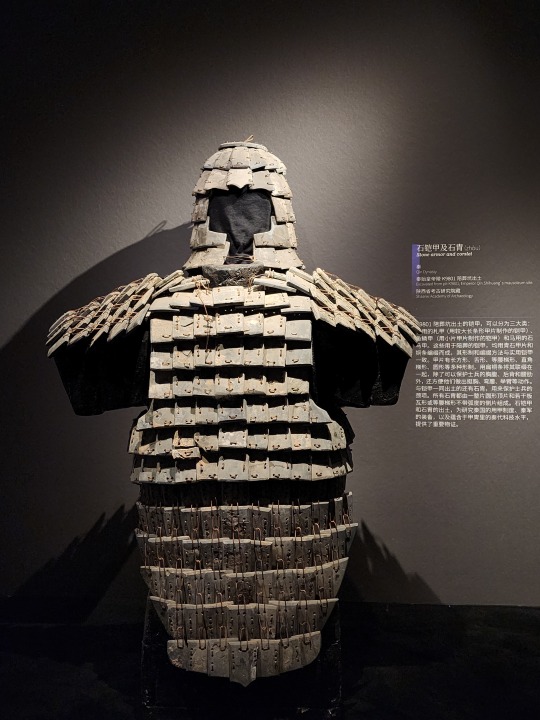
#2024 china#xi'an#china#shaanxi history museum qin and han dynasties branch#chinese history#qin dynasty#han dynasty#warring states period#three kingdoms#history#archaeology#mdzs
72 notes
·
View notes
Text
Dungeon Meshi Liveblog: Endgame...
I have no real notes on the 'escape from the dungeon' sequence, other than that it IS going to be fun to have an epic 'galloping away from total urban collapse/tidal wave' sequence in the anime.
.

This is technically accurate-ish but also totally not, nobody but Laios (and we the reader) knows what happened in that final confrontation, and I wonder if he'll tell them? He has no reason not to, other than it being...deeply Weird(TM) in the way that only Laios really is.
.

Namari expresses many feelings, including love, through violence, and I respect and appreciate that.
.

I tagged this before, but: future royal advisors lmaoooo. (I know Shuro has his own princedom to rule, but not yet, okay, and even once he inherits, lbr every time he visits Melini for diplomatic reasons, Laios is going to be like, "Shuro!! :D Come to dinner! Do you have any ideas about [infrastructure taxes/crop rotation/vigilante assassinations/etc issue of the day]?")
(Note 2: I also know his name is "Toshiro" but the characters haven't stopped using the mispronunciation, so I'm going with what's dominant in the story.)
.

He Suffers for this friendship :)
.

CHILCHUCK IS BEING MEAN TO HIS FRIENDS AGAIN! NATURE IS HEALING!!
.

THEY'RE BESTIES YOUR HONOR!!
Fun fact: this specifically, screenshot at 4:46am, was the point at which the combination of visibly lightening sky, mortifying threat of my roommates waking up early and seeing me still up, and the fact an eager Shuro/Laios hug signalled that clearly everything was going to be basically happy from here on out, all combined to make me finally close my laptop and get ready for bed...whereupon I read the rest of the comic in bed, because I REALLY needed to see Falin safely rezzed, for my own peace of mind.
.

Hell yeah time to eat! our! girl!!!
And btw, shoutout to Laios for, indeed, eating the Winged Lion. King shit. (/Yaad voice) (ah shit, is someone going to have to break it to Yaad and all the other villagers that their "prophecy" was a demon's manipulations? Or has Yaad picked that up by now while traveling with Izutsumi?)
.
Kabru: You know what you were doing, right?
Laios: 8|
Kabru: Never mind, don't answer that, so I can sleep at night ever again. Actually, never answer that, especially in front of any sort of press and/or foreign nationals.
.

I really like how the orcs aren't offering Laios kingship so much as sanctuary. The underground here is theirs, because nobody else ever wanted it, just like nobody ever wanted them. If Laios is going to be arrested by elves if he stays above ground, and Pattadol and Flamela with their oh-so-polite and flattering invitations trying to do, then he's an orc in all but name and form, and he's welcome among them for the rest of his life.
.

Laios: I need you to help me eat my sister!
The rest of the party, as one: We know this sounds insane and we're sorry about that.
.

HIGHLIGHTS OF THIS PANEL:
Marcille resignedly headlocking Izutsumi so she doesn't maul anyone in response to being swarmed
Shuro, under duress, defaulting to strangling Laios (again)
Laios rolling his eyes because he's so accustomed to and tired of everyone reacting overdramatically to his perfectly reasonable requests
Kabru just rubbing his temple. He has a headache. He's so tired that he's not even trying to talk anyone down from anything.
Chilchuck closing one eye like maybe if he pretends to be asleep he doesn't need to be involved in this.
Holm nervously saying that he can't because he keeps gnomesher (gnome kosher)
.

[happy sigh] politics!
I just love love love the 'all the random disparate allies you made along the way rally together at the end for an epic battle to defeat the big bad" - except the big bad is already defeated. USUALLY the way that works is:
Core hero party faces pre-plot climax interparty conflict, then resolves it
Rally disparate allies made throughout the journey to fight the Big Bad (note: allies may rally themselves; still counts)
Fight Big Bad first as a group, then winnow/isolate down to core party, then down to single Main Protagonist who faces and defeats the Big Bad in a character foil-heavy, extremely thematic final confrontation
Everyone lives happily ever after, the end!
In Dungeon Meshi, however, it was:
Disparate allies made throughout the journey rally together to...help the core hero party deal with their pre-climactic interparty conflict! (Marcille's monster army - which does still come down to the core party, of course)
Core party, then isolated to single Main Protagonist (Laios) faces and defeats the Big Bad in a character foil-heavy, extremely thematic final confrontation
Rally disparate allies to accomplish what Laios explicitly says was the TRUE goal all along: reviving Falin! (Via eating as a group because that's live! understanding! connection! life!!)
Everyone lives happily with continuous hunger, because that's what it means to live ever after, the end!
I JUST THINK IT'S NEAT
.

It is sooo notable, though by this point unsurprising, that the elves' chief consideration of the consequences of all of this is that "things" (magic, international politics, etc) may end up "harder to keep under control."
My personal theory/headcanon-until-proven-otherwise is that mana levels above-ground will simply never fully subside to their dungeon-era levels again, and dungeon mana levels will be correspondingly lower - it'll all even out, basically, though underground will still have generally higher levels. This means:
there will be more monsters on the surface, especially large ones
magic will be easier for all races (though limits on how much they can hold at once will remain)
"dark" ancient magic, which (I headcanon) is particularly defined by an assumption that there is a Shit Ton of mana to draw on, will become easier and thus more common...which is okay because "need huge power source to draw on" is no longer the first step on a slippery slope to "let dungeon demon consume the world."
corollary: Marcille is going to live her best damn life studying and innovating with the above
.

This micro-interaction is so sweet. Kabru isn't even talking to Laios, but he's still keeping him in mind, and he so casually says "my friend."
.

TO LIVE IS TO WANT!!! CONTINUOUSLY! YOU JUST GO ON!
.

It's so great and interesting how much the Canaries care about Mithrun! It'd be so easy for him to just be their royally-imposed boss, or their weird mascot that they have to take care of, and both of these things are part of the dynamic. But they also all care about him as a person! Fleki was smothering him like a doll a minute ago, but the instant there's real hope for his life, she's jumping on it breathlessly! They're all suggesting hobbies he could take up, and standing around rapt and breathless waiting to see if Kabru's speech works to get him back on his feet!
There's definitely parallels to be made with Laios here, in terms of adventurin party rolling their eyes affectionately at their leader and saying, "yeah, we WOULD follow this total freak into hell. That's our day job, actually. #onlysomeregrets".
.

Mithrun... /single tear
I just wanna see this panel in color SO BAD, though. The green grass, the pale brown earth and the paler birch trees, and the semi-translucent ice fracturing the dark red dragon meat, with Mithrun's pooling green cloak and these 2 guys standing amids all of it... It's going to be so striking.
.

I've decided that the one (1) headcanon I'm holding in total defiance of explicit canon is that TO ME, Yaad was the original concept art where's she's a fairy princess in aesthetic, the perfect princess-in-the-tower for a brave knight to rescue and so earn the right to kingship of the land.
She still ends up possessing her grandfather's body, to be clear, and having this and every other conversation. It just intensifies the "I survived 1,000 years of being a ghost by focussing all my hope on THIS TROPE and you are going to play it out!!" Sure, marriage isn't an option anymore but that's fine, that wasn't the most important part! If Laios doesn't know how to govern, then she (in her grandfather's body) will teach him! Or else!!!
TLDR Yaad's gender is Princess and I will not be taking counterargument unless it's very compelling.
.

Lol @ how 1 of these guys is the actual, legally appointed ruler of the island and 1 is the top local crime boss, and everyone, even Laios, know they're on equal footing (at best - the Island lord is not a competent man.)
.

Kabru of Utaya, PR Professional :)
.
This really is a fun little chapter, with Izutsumi's struggle to figure out what to do next mirroring Laios's. She's wandering freely, insisting on her own freedom - and nobody is arguing with her! Everyone takes it for granted, so much that she feels a little unwanted! While every conversation she walks into involves responsibilities to others.
.

Holy shit, forbidden civvies!Chilchuck. He has his sleeves rolled up and collar open and everything, sluttily baring his collarbone and a hint of chest hair... He's even implicitly about to get his forearms blood-splattered, while doing a domestic chore and explaining the importance of responsibility to his teen(?) adopted catdaughter. If he still looked like the 50yo tallman with 5 o'clock shadow that he equivalently is, he'd be the hottest sexyman on tumblr right here.
.

Even though it has vegetables! Because it's made with love and life!!
#dm lb#dungeon meshi#delicious in dungeon#stopping here bc otherwise i bet i'll hit the 30 photos per post limit before i'm done#dungeon meshi spoilers
93 notes
·
View notes
Text
The number of people in the Republican’s [Trump] orbit who’ve been convicted of crimes in recent years is so great, The Washington Post once described it as the “remarkable universe of criminality“ surrounding the former president.
That was five years ago. It’s even more remarkable now:
Donald Trump was charged, convicted, and is awaiting sentencing.
Trump’s former campaign chairman, Paul Manafort, was charged, convicted, and sentenced to prison.
Trump’s former campaign vice chairman, Rick Gates, was charged, convicted, and sentenced to prison.
Trump’s former personal lawyer, Michael Cohen, was charged, convicted, and sentenced to prison.
Trump’s former adviser and former campaign aide, Roger Stone, was charged, convicted, and sentenced to prison.
Trump’s former adviser and former White House aide Peter Navarro, was charged, convicted, and is currently in prison.
Trump’s former campaign adviser, George Papadopoulos, was charged, convicted, and sentenced to prison.
The Trump Organization’s former CFO, Allen Weisselberg, was charged, convicted, and sentenced to prison.
Trump’s former White House national security advisor, Michael Flynn, was charged and convicted.
Trump’s former chief strategist, Steve Bannon, was charged with wire fraud and money laundering, in addition to a conviction in a contempt case similar to Navarro’s. He’s currently awaiting sentencing.
Though he was later acquitted at trial, Trump’s former inaugural committee chair, Tom Barrack, was charged with illegally lobbying Trump on behalf of a foreign government. (Elliot Broidy was the vice chair of Trump’s inaugural committee, and he found himself at the center of multiple controversies, and also pled guilty to federal charges related to illegal lobbying.)
Two lawyers associated with Trump’s post-defeat efforts, Kenneth Chesebro and Sidney Powell, have pleaded guilty to election-related crimes.
And did I mention that former president’s business was itself found guilty of tax fraud? Because it was.
This does not include the fact that a jury held Trump liable for sexual abuse in a civil case.
By Steve Benen
73 notes
·
View notes
Text
@markeatsmeat
Wow. Joel Salatin, a farmer and regenerative agriculture advocate, has been offered a position within the USDA. He will advise Thomas Massie who’s agreed to be Secretary of Agriculture. Here’s the full message posted to his website today: “The deplorables and garbage people won again. Can you believe it? I've been contacted by the Trump transition team to hold some sort of position within the USDA and have accepted one of the six "Advisor to the Secretary" spots. My favorite congressman, Thomas Massie from Kentucky, has agreed to go in as Secretary of Agriculture. He's been the sponsor of the PRIME ACT, which, if pushed through, would be the biggest shot across the bow of the entrenched industrial meat processing system we've seen in a century. Let liberty ring. Wouldn't that be a change of fortune for Big Ag? If RFK Jr. goes in as Sec. of Health and Human Services, everything will be inverted. Talk about the coolest turn about. He'd be the boss of the Faucis and Francis Collins--the whole covid anti-science crowd. Wouldn't that be a change of fortune for Big Pharma? And if Elon Musk goes in as a Government Waste Czar, do you think he could possibly find something? Here's an interesting tidbit. All the income taxes in the U.S. are $2 trillion a year. Government spending and borrowing are so out of control that if we eliminated $2 trillion from the budget, it would only set us back to 2020. Does anyone think returning to government spending in 2020 would destroy things? Of course not. So all we have to do is cut federal spending to 2020 levels and we can eliminate income tax. Period. Done. How would that make you feel? Most people don't know enough history to know that the federal government was to be financed entirely from tariffs and excise taxes. In fact, as a nation we operated just fine for nearly 150 years without an income tax. The only president who eliminated the national debt was Andrew Jackson, and he did it by eliminating the second bank of the U.S. Nearly 100 years later we got the third bank, known as the Federal Reserve, plus the income tax. During that time, tariffs averaged 40-50 percent. After the income tax, tariffs dropped to an average of about 7 percent, where they remain today. If we went back to 40 percent, like we had for nearly 150 years, we would bring production home and free our citizens from impoverishing taxes. Dear folks, this is a watershed moment to take a creative and serious look at the sacred cows in our nation and fry some serious burgers. We don't know history. We don't know liberty. We don't know earthworms or aquifers or immune systems. I'm hoping this election is an opening to discovery. Perhaps we could even figure out how to put negative occurrences like jails, pollution, and cancer on the nation's balance sheet, as a liability rather than an asset (Gross Domestic Product--more jails? wonderful, pour more concrete and make more jobs). Perhaps we'll eliminate federal involvement in education, from kindergarten to college. Make every teacher accountable to performance. Eliminate ALL federal intervention in the food system, in farming, in energy. The Constitution (read it) doesn't allow for any of this and it's time to examine all of it. Shut down foreign military bases; bring them all home. Stop ALL foreign aid, from USAID to military aid. Sell stuff is fine; giving it isn't. I think whatever taxes we pay should be able to be designated to certain departments. That way we the people could support or defund departments directly. The reason we have K street is because all our freedoms are for sale. Eliminate government manipulation and the lobbyists all go home. These are simple things. Let's do it.” https://thelunaticfarmer.com/blog/11/6/2024/celebration?format=amp

28 notes
·
View notes
Photo
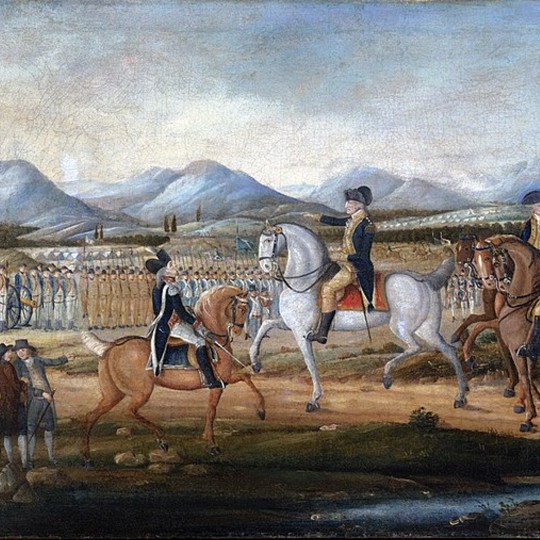
Whiskey Rebellion
The Whiskey Rebellion was a violent uprising that occurred in western Pennsylvania in 1794, in opposition to an excise tax on liquor. After anti-tax protestors assaulted federal tax collectors and threatened to march on Pittsburgh, President George Washington (served 1789-1797) raised a federalized militia that swiftly suppressed the insurrection. The incident strengthened the authority of the United States federal government.
Alexander Hamilton had proposed an excise on distilled spirits to fund his ambitious economic program, which was enacted by Congress in 1791. This so-called 'Whiskey Act' proved unpopular, particularly among the small farmers living on the western frontiers of the United States. Liquor was an important commodity in the West, where many farmers operated small stills and used liquor as an informal currency; the new excise tax was something that many of them could not afford. Protests broke out in 1792 and 1793, with much of the rhetoric accusing Hamilton and his nationalist Federalist Party of being aristocrats who sought to use the tax to subjugate the small western farmers and deprive them of their liberties. The Federalists, for their part, accused the protestors of fomenting anarchy and urged President Washington to take decisive action.
The anti-tax protests escalated in the summer of 1794 when protestors attacked the home of a federal tax collector before demonstrating on Braddock's Field outside Pittsburgh, Pennsylvania, where they talked of attacking the federal garrison in the city. Washington finally yielded to his Federalist advisors and called up a federalized militia to suppress the rebellion. Led by Hamilton and Virginia governor 'Light-Horse' Henry Lee III, the 12,950-man militia army marched through western Pennsylvania in October 1794, with all opposition melting before it. This show of military force ended the Whiskey Rebellion and proved that under the new Constitution, the federal government was strong enough to enforce adherence to its laws. However, the government's aggressive response unnerved many Anti-Federalists, who feared the growing authority of the national government. This controversy contributed to the rise of the Democratic-Republican Party in opposition to the Federalists, ushering in the birth of political partisanship in the United States.
The Whiskey Act
In the aftermath of the American Revolution (1765-1789), the fledgling United States was saddled with a mountain of debt. The national government owed $54 million in debt, while the states collectively owed an additional $24 million – such had been the "price of liberty", as Alexander Hamilton, Secretary of the Treasury for the Washington administration, remarked in the opening pages of his Report on Public Credit (Chernow, 297). While other men may have balked in the face of such an overwhelming amount of debt, Hamilton smelled opportunity. In his report, submitted to Congress in January 1790, he recommended consolidating national and state debt into a single sum to be paid off by the federal government; this would have the dual effect of establishing public credit while increasing the legitimacy of the federal government. Although the plan sparked fierce debate and was hotly opposed by Anti-Federalists, it was nevertheless approved by Congress in the summer of 1790.
It was now left for Hamilton to figure out exactly how the federal government was supposed to start paying off such an exorbitant sum. The existing duties on foreign imports, which at the time made up the primary source of income for the federal government, were already as high as Hamilton dared raise them but were still insufficient to fund his ambitious financial program. The only feasible solution was to implement some kind of excise tax on domestically manufactured goods. Although the new United States Constitution granted Congress the power to levy excise taxes, it was abundantly clear that such a move would be unpopular; so soon after the Revolution, many Americans still associated direct taxation with tyranny. Still, Hamilton sorely needed the revenue an excise tax would bring. He believed that a tax on distilled spirits would be less objectionable to the public than a similar tax on other goods; to sway the public to his side, he framed it as a 'sin tax' that would reduce Americans' consumption of hard liquors and had physicians speak out on the harmful effects of alcohol. Despite the skepticism in Congress over Hamilton's so-called 'Whiskey Act', the bill was passed in March 1791.
Hamilton had known that the Whiskey Act would be controversial, but he had not anticipated just how outraged many Americans would be, particularly among the settlers along the country's western frontier. The land to the west of the Appalachian Mountains was still sparsely settled by white settlers; indeed, the largest western settlements still had only a few hundred permanent residents, and the few roads that existed were poorly maintained. As a result, small western farmers, who made a living growing crops like corn, rye, and grain, had difficulty bringing their produce to market. Oftentimes, their goods would spoil before they could get to a settlement large enough to find buyers. To combat this, many farmers distilled their grain into liquor, which was much easier to transport and preserve. The practice became so widespread that by the 1790s, most western farmers operated small stills, and liquor was often used as an informal currency.
Alexander Hamilton
John Trumbull (Public Domain)
The Whiskey Act, therefore, was widely viewed as an attack on the livelihoods of western farmers, many of whom could not afford to pay the tax. Critics likened the tax to the hated Stamp Act of 1765, which had been one of the catalysts for the American Revolution. One pamphleteer accused Hamilton and his Federalist followers of "wishing to imitate the corrupt principles of the court of Great Britain" by introducing such an excise tax (quoted in Chernow, 469). Many saw the Whiskey Act as an attempt by the central government to extend its tendrils of power into the West and force the frontiersmen to feel the authority of Congress. Protestors began to accuse the federal government of being run by "aristocrats" and "moneyed men" who sought to deprive them of their liberties (Wood, 136). This kind of rhetoric brewed fear, which in turn led to instances of violence; as had happened to the British stamp distributors three decades before, federal tax collectors became the targets of unruly mobs, which threatened to beat, whip, or tar and feather them. In August 1792, Colonel John Neville, the federal tax collector in Pennsylvania, was accosted by one such mob which promised to "scalp him, tar and feather him, and finally reduce his house and property to ashes" should he go ahead and collect the whiskey tax (Chernow, 469).
Continue reading...
25 notes
·
View notes
Note
Been here for a while, enjoying your fics. ❤️
Could you consider to write something including post - concussion emeto? Maybe with Matthew, because who else would be hit 😅
Greetings,
A.
Hello A.! I'm so happy you are enjoying yourself, that's super sweet! ❤️ Thank you so much for the request! Ran away from me a little but includes what you wanted :D I'm very honoured.
This one's crying, the other's sick
Seline is upset and crying. Matthew comforts her, when it turns out he came home with a concussion.
There will be no direct trains because of construction work. You can take the bus and the train connection, but we can't guarantee your way if either is delayed.
Just great. Exactly what she needed for the travel home to see her parents.
Seline knew she was freaking out for no reason. This fact didn't make it any easier to not do it.
Her life has always been divided into two places. Bratislava and Vienna. Home and school, parents and friends, Slovak and German.
She knew and her parents knew that her life was heading into the direction of Vienna - more money, more prestige, the use of languages. Slovakia was a nice home, but everyone who had any sense, ambition and knew just a bit of English moved out for college and never returned.
But Seline doubted as many people had such a good relationship with their parents. That's why she wasn't moving out even after 10 years of travelling. She even felt sorry for all her classmates and colleagues, many of which had to move to Vienna at 18 for university. Without parents and roots and childhood friends. Independence and adult responsibilities. Or were they proud of it? Was it a good thing they couldn't be children for that long?
When she asked her friends from countries farther away, like Bulgaria or Italy, they said it was fine. That they couldn't imagine living with their parents again or still. That it was nice to live alone.
Maybe they just didn't like being around them as much as Seline. Having such close relationship with your own mother was from what Seline could see, quite the exception. Her mother was her most trusted friend, her confidante, her idol and advisor. Seline's friends didn't call their mothers for two hours a day and they didn't visit every weekend and they didn't...
Seline wouldn't have moved out if it wasn't for the fights with her younger brother. And because she got good work at the university as an assistant, but that was running out. Every year was a risk of not getting the contract prolonged. She considered studying another master degree, cause as long as she was a student, they were more likely to keep her. Graduated non-students were more expensive because of taxes. PhD students were the most risky, cause they go no funding without an actual job at a project or faculty. And those were all temporary, only for a limited amount of years. Not to mention the law in Austria that you couldn't work at the same university more than 8 years on temporary contracts, which was supposed to protect university staff. Except the universities, instead of employing people without temporary contracts, didn't employ them at all, until they came with a few years of foreign experince. Go for a two years to England. Or France. Or anywhere else. Uproot yourself and maybe we will get you back.
Very family friendly.
So it somehow happened that Thursday morning she found out that her train for Friday to visit her parents would take 1.30h instead of 50 minutes and because the bus could be late and the train that you should change after wouldn't wait in the case it was, meant she would be straned somewhere in Parndorf.
So she would have to take the train before, that was direct and safe, which meant she would travel for an hour earlier, miss the connection she would have if the train were normal, wait two hours at the main station in Bratislava to get to her parents house. Her house. Whatever it was.
This would normally not anger her to the point of tears, but it was about a week before her period, so PMS was hitting her hard.
She didn't want to go to the train sooner. Or wait at the station because she missed the direct beautiful train that would get her to the home town near Bratislava.
She could take a taxi and pay more. Or take her own car. But Seline hated driving. It was stressful and fearsome and horrible responsibility and each bigger car or faster driving car made her jump in her seat in deadly fear. Her father would scoff at her for being so panicked about it. That she should drive more to get rid of it.
Well. Because of the fear, her main goal was not to drive.
Either with time with the train, with money with the taxi or with effort and nerves with the car. Nothing was for free.
She left her car at her parents anyway. Didn't need it in Vienna with all their great public transport connections. It was a relief she didn't gave to consider going with a car and no one could guilt her into using it.
She had two roomates who liked driving and cars. But she couldn't exactly ask them for a 1 hour long drive on the highway to Bratislava to see her parents.
Isaiah didn't complain about her visiting her parents during weekends. Since their schedules at university weren't packed, they had most Mondays free and other days during the week with only one seminar or online class here and there and could be together.
Seline loved not having to commute. To stay in bed until 11, talk with Isaiah over lunch, take a walk in the park or by the river and go to a seminar at 5 in the evening, meet with friends after or a bit before. Leisure nice days. Working 8-5 terrified her. She loved the flexibility, the way she could rule her time, do homework or write essays whenever she felt like, write stories and her poems whenever she was inspired, listen to music till 2 in the morning or binngewatch series all evening.
Though evening were usually reserved for movie nights with the whole trio. She loved those too.
Standing between two worlds was always a trait of hers. Something she was at peace at. But deciding between one home or the other, one city or the other and the time between pained her still, or even more so, after 10 years of back and forth.
If she could just buy that two generational house somewhere close to Vienna, on the fringes of the city and have them all there. Travel would take 20 minutes with the subway, her parents and her pack would be at the same place and they could have a view on the fields and not on the people and noise filled buildings of the city...
Except her parents still worked in Bratislava, and her grandmother and her uncle lived there and their families lived there and...and her parents didn't even speak German.
She could go back and live in Slovakia. She would get a high paid job just for speaking German and English so well. Lots of her friends from primary school did that. Those that didn't leave for France, US, Belgium or as far as Australia, that is.
She never saw her future in Bratislava. Not with the communist looking buildings and shabby streets and corrupt government and horrible health care. But she grew up around fields, open sky and on the train. City life was culturally shocking.
Seline walked back and forth on her floor, stamping her feet in anger. She let the frustrated tears loose, no one was home. Updating her train app if the connections didn't change after all didn't bring any new results for the 5th time.
She ended up in the hall, by the stairs, leaning against the wall. Today was a good day to wallow in self-pity as any. Hugging her knees, she cried quietly, half-realizing she was just being dramatic and the situation wasn't half as bad as her riled up emotions would have her believe.
"Whoa, hey. Are you crying for real?"
Seline almost jumped out of her skin at Matthew's tone, shooting up to her feet. "W-what are you doing here?!"
Matthew stood on the last step of the steps next to her. His knuckles were still wrapped in white bandages, so must have been boxing and returned sooner. He was gripping the railing tight and looked pale and tired, but the sarcastic tone and raised eyebrow chased her worries away. "I live here. Duh."
"T-that's my floor." She hurriedly rubbed at her face to get rid of the moisture. "I didn't hear you arrive."
"You were...preoccupied," Matthew said dryly. "So what's up? Did something happen? Should I go beat someone up?"
Seline chuckled despite the tears and her emberassment for him to catch her like this. "No. That's really sweet, but not at all necessary."
Matthew gave her a dubious look, then crouched down on the ground next to her, sliding down the wall slowly. "Something must have happened."
"Nothing happened. I'm just being silly." She waved his concern away, trying to smile.
"Uhm. Do you want me to call Isaiah?"
"No!"
Matthew blinked at her vehemence.
Seline ran her hands through her hair and sat down back next to him, back against the wall. "Nothing happened. It would just worry him."
"If he could comfort you, I'm sure he would be happy to worry. Maybe I just can't say what you need to hear."
"It's fine. Seriously. I'm overreacting because of hormones. Nothing is wrong." She flushed a little, realzing she said hormones, but when Matthew didn't laugh or say she was a hysterical girl, her shoulders slumped in relief and she relaxed a little.
"I didn't realize you two were so similar. Always such a put together front," Matthew commented, looking away with a sigh.
"You really want to hear my stupid reason?" She showed him the screen of her phone, too quickly for him to focus without realizing. "The trains won't be running at the time I wanted to go home tomorrow. I will have to leave early and wait up till my parents come home for them or take a risky train-bus connection that doesn't have to work out."
Stunned silence. "Can't you just drive?"
"No, I can't just drive," she said, annoyed. "I hate driving and I don't have my car here and you can go and say how this is my fault for not overcoming myself with the car and-"
"Fine, I give up." Matthew put his hands up in surrender. "You have a total right to hate driving. You want me to drive you?"
"I-" Seline spluttered for air. "I-I can't ask that of you-"
"Well, you aren't asking, I'm offering," Matthew said with a shrug. "I can drive you to your parent house and then go back. Your trains will work on Sunday, right? I can pick you up at the station."
Seline crossed her arms on her chest, avoiding his gaze. "It's just this one time. I can take the trains normally, the timing fits well, with them coming home and all. Just this once." Shouldn't she invite him over when he drives her that long? She didn't invite him or Isaiah to meet her family yet.
"It's no problem," he said tiredly. "Stop defending it like I'm moving a mountain for you. If you told this to Isaiah, even hinted at it, he would offer the same."
Seline nodded, eyes overflowing with tears again, this time from how touched she was. Seriously, today was such a stupid day. She was crying for everything. "Thank you."
"Oi. What now?" Matthew said, a little exasperated. He turned to her, wrapping his bandaged hand around her elbow and then pushed her forward against his chest.
Seline melted at the contact, pressing her crying face against his chest. Matthew enclosed his arms around her, practically dragging her to sit in his lap as he held her. She sat with her side and arm against his chest.
"I'm sorry. I'm sorry. This is just over emotion. Don't worry," she said reassuringly as his hug tighthened.
He sighed into her hair.
She laughed nervously against his ear, chin on his shoulder, wanting to fill the silence with something. "No way I want Isaiah to see me like this. Giant minus point, to have such an emotional girl on his hands. He would be running for the hills."
Matthew snorted. "But you don't mind me seeing?"
"You won't break up with me," she said with a half-broken smile.
"He wouldn't either."
"Not on the first time. But on the fifth time? Tenth time? I better not give him more difficult times if I can help it, before he starts counting."
Matthew shook his head. She could feel the movement against her face as she closed her eyes. "No one is counting. That's not what couples do."
"Oh really? It's all I'm doing. Counting how much we are giving each other and if it's still ends up in mutual benefit."
She could practically hear the eyeroll in his voice. "I don't think it's supposed to work like that. It's not a business deal."
"It's very similar. I have to be pretty enough, attractive enough, smart and entertaining so when I really really need something, I can get a favour and not waste on something stupid and minor like this-"
"Isaiah would run himself to the ground caring for you and never think of something like that."
"Well, that's just because he is kind and selfless and so self-sacrifacing towards everyone. Doesn't make me any special."
Seline frowned. "I love you."
Matthew leaned forward, his face in his hands, leaving her with the view on his back. "You think emotion doesn't play any role? People aren't just a list of plus and minus traits. You feel something about them too. If everyone was so strick as you say, I wouldn't make the list for anyone."
There was a beat of silence.
Matthew jerked underneath her, looking up, face going all red. "What? Where did that come from?"
"You are right." Seline shrugged. "I'm very rational about the whole dating thing, comparing and counting things, because I don't want the pink glasses to blind me to our compatability. But when it comes to friendships or family or...well, pack, it's all about feelings and I know what I feel. I love you. In the family sort of way."
Matthew rubbed his forehead, unsuccessfully trying not to blush. "You have never said it to Isaiah, you can't blurt it out like that to me."
Seline suspected there hadn't been enough people saying it to Matthew in general. "I love him too. But if we work out as a couple, I have to love him in that other, romantic way too. I'm not sure we are that far yet."
Yes, she was attracted to Isaiah. It's been very hard for her to fall in love, to respect let alone to admire someone else, so she was very happy she found him. And he was intelligent, thoughtful, considerate and he put so much effort into everything and she admired him for many things...but she never had such a long relationship, as she was not interested in dating in her teen years, and the inexperience was making her cautious.
Matthew shook his head, burying it in his hands once again. He was breathing all harsh and fast. She could feel his chest heave underneath her. She wrapped her hands around his neck, suprised at how sweaty he was and how weirdly pale...was he like that from the start?
"Hey, Matt-"
"You two should really," he gulped loudly, shuddering, "have a talk. Being this tense and counting around each other can't be- hrrrk-" he burped loudly, slamming a hand to his lips.
Seline retracted her arms back, putting one gently on his chest and the other on his stomach. He was still breathing so fast and his stomach was heaving, like it shriveled under her palms...and suddenly Matthew leaned to the side and gagged violently over her arms on the floor.
"Matt!" she yelped as his stomach heaved and he gagged again, this time bringing a mouthful of water. Seline rubbed his stomach, feeling it contract as he heaved the third time, this time bringing up a big wave of water. "What's wrong with you? Are you- did you- you were feeling sick the whole time?"
Matthew spat onto the ground, giving a full-body shudder. "Sorry. I just..."
"Is this some kind of flu? Did you eat something bad?" Crisis always brought a calm over her, making her practical. She could feel her mind clearing from trivial concerns, emotions in the backround.
"Not really. My sparrring partner got a really good hit to my head today...I guess I was feeling a little light-headed since then." He blurred his words together a little and he was still that sickly pale.
"Wait, you mean to tell me you are concussed?" She tried to scramble away from his lap, not wanting to add weight to his misery. He was feeling sick and dizzy from a hit to the head and let her blabber on?
He tighetned his hold again, squeezing her against him, hanging his head on her shoulder. "Sorry...can I just...I don't really want to move." He smiled crookedly. "I can't believe I survived climbing up the stairs."
"Matt, you silly fool. You should have said something." She threaded her fingers through his hair, looking for a bump. "Did you heal yourself?"
"A little. Didn't really stop hurting all the way. And my, ehmm, ears are ringing a little." He winced at her touch but didn't pull away.
"Come on, you should get some sleep." His head was basically limp on his neck, barely holding himself up. She figured he could sleep since he healed himself with this shadow. It must have been the symptoms that remained. "You can stay in my room, I can't really help with the stairs like Isaiah can. You will be more comfortable there, okay?" And they would get away from the mess on the floor.
Coaxing Matthew to unwrap himself took another 5 minutes. She held him under the elbow, trying to stabilize him, but they both knew he was too big for her to hold his weight, should he fall. He stumbled the few steps to her bedroom, holding onto the wall and her for support.
He basically collapsed on her favourite pillow, squeezing his eyes in a painful way that cued her in on the light. She closed the curtains on the windows and fetched a wash-basin from the bathroom, then climbed into the double bed with him.
"Hmmmm...Do I have too many minus points for vomiting to get another hug today?" Matthew mumbled sleepily, rolling to his side as she adjusted the covers over him.
"You are such an idiot," she said fondly, wiggling herself under his arm, face against his chest. It was a warm, comfortable position for her too.
"You sure Isaiah won't mind?"
Seline chuckled. "From you, he won't. My guess? He will end up sleeping here today too." She kissed the top of his forehead. "The basin is right next to you. Tell me if you feel sick again. Should I get you a painkiller?"
"Nah. Can't stomach it right now. Just stay."
It warmed something inside her that he wanted her so close, that he might have hugged her the first time for his comfort as well. Or maybe just for her. He was such a marshmellow, it was a shame it only came out when he was feeling sick.
@bellysoupset
#sickfic#whump#emeto#emeto fic#comfort#concussion#I got your request Soup#and needed to write this before I get to that one#cause there will be a connection yay
46 notes
·
View notes
Text
Selcouthian World Building: The Agrona Councils and Kingdoms
In the kingdom of Agrona Morgana there are 9 kingdoms within the main kingdom.

Each kingdom has a council, these councils range from 5-11 people per council.
Overall, the hierarchy of councils goes as follows:

Grandmasters Council:
The council responsible for overseeing all action done by the government. However, they rarely ever meet as this is not necessary all the time.
Usually used for: plans of war, crisis that have inflicted the citizens, among other large scale issues.
(Pandora is on this Council later on)
Grand Judicial Council:
Self explanatory, responsible for ruling over federal laws and the highest profile cases.
(Noah is on this Council later on)
Grand Executive Council:
Used for enforcing laws and dealing in foreign affairs.
(Pandora is also on this one later on)
Grand Legislative Council:
Makes all other laws, regulates commerce, and controls taxing and spending policies.
Ruling Council(s):
The councils that rule over the individual kingdoms (have their own Executive, Judicial, and Legislative councils)
Local Council(s):
Similar to the Ruling Councils, just local to cities and small territories inside the kingdoms.
The Grandmasters are:
Morgana - Diana De La Dáinn (Female) (Later Pandora De La Dáinn (Female))
Edelweiss - Arya Adair (Female)
Bronwen - Bastian Warblaze (Male)
Noel - Aerith Windward (Non Binary)
Bylur - Samuel Verlice (Male)
Albina - Lucien Huxley (Male)
Fintan - Marius Bozzelli (Female)
Wynn - Serian Wix (Non Binary)
Dwight - Lysandra Odessa (Female)
Fun fact: Noah does NOT get put on the grandmasters council when he becomes grand judge
He IS however considered an advisor to Pandora and does occasionally sit in on meetings and give his two cents as the grand judge
So while he’s up high, he’s not on top
Noah is fine doing his thing and letting his wife do the big stuff, he’s just here to oversee cases and make sure the wrong people aren’t put in prison.
Each Kingdom is responsible for a different aspect of trade, communications, and/or resources. Some of these do overlap.
Morgana - Foreign Affairs, Weaponry, Arts
Edelweiss - Farming (Fields)
Bronwen - Fishing, Sea Trade
Noel - Music, Arts, Processing Food and other materials
Bylur - Land Trade, Farming (Mountains)
Albina - Foraging, Farming (Underground)
Fintan - Mining, Rare Resources
Wynn - Mining, Construction Materials
Dwight - Exploration, Weaponry
#Selcouthian world building#the tales of selcouth#the crux#bowl mixes#writeblr#writing#writers on tumblr#original character#oc#original oc#original story#original writing#writeblr community
16 notes
·
View notes
Text
U.S. Vice President Kamala Harris’s selection of Minnesota Gov. Tim Walz as her running mate was met with enthusiasm from Democrats across the party, including from the party’s left wing. A big part of this is Walz’s solidly pro-labor governing record and his appeal to working-class voters, which was on display on Wednesday when he spoke at the Democratic National Convention in Chicago.
Although his championing of working Americans’ jobs, pay, and rights has obvious and important domestic appeal, it also has a potentially significant implication for foreign policy under a Harris-Walz administration.
One of the Biden administration’s most important projects, sometimes summarized as “post-neoliberalism,” has been the move away from unfettered so-called free trade—the pro-corporate theology that dominated the past few decades of economic policymaking. The government is now fully back in the business of investing in U.S. workers and communities. (A 2023 report tracking this progress was published by the Roosevelt Institute, a think tank helping to drive this transformation.)
As vice president, Harris has played a key role in this pivotal project, and selecting one of the most pro-worker governors in the country as a running mate signals that she is all-in on this shift. This is great news, because not only is this post-neoliberal, pro-worker agenda likely where the election will be won, but it is also central to the larger goal of defending global democracy.
Conservatives have noticed. “By picking Tim Walz as her running mate, Harris has gone a long way toward bolstering her left-populist flank and neutralizing [Republican vice presidential candidate J.D.] Vance’s potential appeal,” wrote Sohrab Ahmari, the founder and editor of the conservative nationalist magazine Compact and a leading voice of the populist new right, when the pick was announced. “Walz can’t be framed as a neoliberal Democrat in the Clinton-Obama mold.”
Vance’s own speech at the Republican National Convention in July was billed as foreign policy-focused, but it was really all about how U.S. elites had failed the country’s struggling workers. Playing up his family roots in a small Ohio town—“a place that had been cast aside and forgotten by America’s ruling class in Washington”—Vance attacked U.S. President Joe Biden for his past support of the North American Free Trade Agreement, for China’s entry into the World Trade Organization, and for “the disastrous invasion of Iraq.”
“At each step of the way, in small towns like mine in Ohio, or next door in Pennsylvania or Michigan, in other states across our country, jobs were sent overseas, and our children were sent to war,” Vance said. While larded over with common right-wing tropes and xenophobic invective, the speech sounded like a road map for how the Republican Party intends to capture the working class.
In its own way, Vance’s speech was a darker, divisive version of a more affirmative and unifying address that U.S. National Security Advisor Jake Sullivan gave in April 2023, which laid out the Biden administration’s global economic agenda. Confronting the flawed assumptions that dominated U.S. statecraft in the past 40 years—“that markets always allocate capital productively and efficiently”—Sullivan rejected the philosophy that “championed tax cutting and deregulation, privatization over public action, and trade liberalization as an end in itself.”
Like Vance a year later, Sullivan acknowledged that elites had failed working people in the United States. He said that not only had an economic integration approach failed as a geopolitical strategy—not stopping China from military expansion or deterring Russia from invading its neighbors—but it also radically increased economic and political inequality, both globally and domestically. The speech marked an important step forward in Washington’s thinking.
However, much less noticed was a speech that Sullivan gave a week later at the Washington Institute for Near East Policy, which showed how the Biden administration still had one foot in the previous era. In that speech, Sullivan laid out the administration’s plan to maintain U.S. hegemony in the Middle East by buttressing relationships with various repressive, undemocratic regimes and stitching together an alliance intended both to contain Iran and box China out of the region.
I noted to administration colleagues at the time that the second speech was a formula for squandering the opportunities of the first. While the Biden administration had discarded some of the flawed foreign-policy assumptions of the past, it continued to hold fast to the idea that Washington can purchase security and prosperity for U.S. workers by exporting insecurity and repression to others, whether in the Middle East, China, or anywhere else. The past 10 months of catastrophic war in Gaza should have discredited that notion, if it wasn’t already.
The United States can build a more equitable global order, or it can frantically try to maintain global primacy, but it can’t do both. The Harris-Walz team has an important task and a big opportunity to diminish this contradiction and complete this transformation. Just as the neoliberal era proved that giving carte blanche to big corporations—whether they’re car companies or weapons manufacturers—is not a means for achieving broad economic progress or security, the past 20 years of the “war on terror” showed that a heavily militarized foreign policy feeds global insecurity and shreds the fabric of international norms.
As outlined by Trump and Vance, the Republican vision is essentially zero-sum: The United States and its workers only win by others losing, and vice versa. The Harris-Walz team can offer a vision of contrasting solidarity, which doesn’t seek to build political consensus by vilifying the foreign enemy of the moment but rather seeks ways to uplifts workers and their communities in every country.
The U.S. public needs to hear more about how diplomacy and cooperation—including with China, can provide other benefits for Americans, as evidenced recently when China imposed new controls on fentanyl precursor chemicals—and about how the issue of irregular migration, which has been a driving force in far-right populism, can only be addressed by improving conditions and reducing violence in the home countries of those migrants—a shared struggle that the labor movement understands and embraces.
A real pro-worker foreign policy doesn’t pit the security and prosperity of Americans against workers in other countries but recognizes that our security and prosperity are bound together. We saw the outlines of that in the speech from Walz, the good neighbor and the inspiring coach, on Wednesday. That is the winning global vision that he and Harris should embrace.
19 notes
·
View notes
Text

These are my personal headcanons of Olrox’s life as a human. I’ve seen many posts and read fics about what was Olrox’s life before becoming a vampire and I did a little research of life as an Aztec which send me into a rabbit hole.
Without a doubt I think Olrox worked as a government official. Olrox worked under the Emperor Montezuna II or what the Aztec word for emperor was “tlatoani.”
The tlatoani ruled the Capitol of Tenochtitlan and lived in incredible palaces with their family and advisors. Right below the tlatoani were the tecuhtli. The tecuhtli were men of importance and ruled the city-states. They lived in palaces and greatly supported by the people and kept the empire running smoothly.
They helped the production of fields, served as a local military commanders, represent the people of local villages and city states, ambassadors and distribute taxes.
The tecuhtli were very wealthy and had palaces within their cities. They were dressed lavishly wearing jewelry, feathers and gold because they were of the noble class. And wore purple because purple symbolizes nobility.
In which Olrox still wears to this day with gold and emerald earrings, he wears purple and the cuffs of his jacket that have golden braces or runes.
Olrox having been a tecuhtli rings home for me because of the way he carries himself with elegance and swagger. And as a tecuhtli he made contact with the conquistadors. Olrox was probably the only one spoke against Montezuma II to not let these Spanish men into their lands because Montezuma thought of the foreign Spanish men to be gods and wanted to hear them out bringing them into the city to get information from believing they can be allies.
Olrox not a believer gods and easily saw this men on who they were: petty power hungry thieves.
Olrox has an uncanny way of reading people just how he read Mizrak like a joke on a popsicle stick he knew these foreign men’s intention right from the get-go. His plea was over ruled by the tlatoani’s decision to letting these smelly and dirty thieves into their empire.
Olrox holds great resentment towards Montezuma II for letting these foreigners into their lands and slowly watch the erosion of the Aztec empire in a span of a year. Watched as Cortez brought the empire down to their knees through lies and treachery destabilizing the empire from within by targeting other rival tribes of the Aztecs to join him. Turning tlatoani into a puppet emperor and Olrox forced to take orders from a foreign invader through Montezuma II. Forced to bow and placate to these dirty thieves and watch the empire break into a civil war while Cortez orchestrated the breech from within.
Only for Olrox to succumb to small pox. Olrox didn’t die and was turned into a vampire in mid to late 30s. As the empire weakened by the plague Cortez managed to build an army from rival tribes and his own back home and brought in vampires along to the new world.
Olrox having turned to a vampire found he had divinity in his blood that he had Quetzalcoatl’s blood flowing in his veins. As he watch his empire crumble he’d seen others fall too from the Tainos to the Arawak, Mayans, the Aztec and the Incas in a span of a few years.
Olrox honed his powers and speaking with Quetzalcoatl to bring him strength. Worked with the priests and learned magic through their teachings and overtime he manages practice his powers and fought against the invaders. Olrox wasn’t the only human who were turned but many others who were turned into vampires and Olrox became a leader to the newly turned vampires and fought the invaders.
Olrox saw first hand what horrors the Old World has brought to his land and vowed to never make that mistake again. Olrox was invited to France and he knew this time he was ready and had no puppet emperor to get in his way of his resolve. He fully intended to screw over this vampire messiah and had played his cards right. Staying away from the chateaux so he can have a better viewpoint from a safe distance and seducing Mizrak because he was the closest proximity to the Abbot who was a forgemaster creating Night Creatures using the demon machine.
Olrox knows how to identify a megalomaniac when he sees one and Olrox had every intent to screw her over but failed to deduce thag Erzsebet Bathory was not only a megalomanic but she was a megalomanic with the powers of a primordial god to bring down the sun. Olrox over the long centuries he lived did not believe in gods and grandeur because he heard it all before of men’s delusion to be greater than they really are and thought Erzsebet was no different and he miscalculated severely!
Olrox had bowed to many delusional men who thought they were ordained by god or simply higher than other men or far more worthy. He had to placate to their demands, praise them and forced to worship these colonizers and give in to their wishes. Olrox had done that countless of times as a human to bite his tongue and to humble himself. Make himself meek to these colonizers. After he became a vampire he promised himself that he’ll never ever now before a colonizing European.
When Drolta told him to kneel Olrox did as she wishes to bow before Erzsebet— to give her his submission. Olrox had never bowed in almost 300 years and forced to bow again. And this time he promises this will be the last time he ever bowed to anyone again.

#whoop!#this was supposed to be a headcanon but it turned out to be a full character study!#I hope you enjoyed it 😭#castlevania olrox#castlevania nocturne#olrox/mizrak#olrox x mizrak
41 notes
·
View notes
Text

Continuing my review and summarizing of Project 2025, the GOP 2024 platform, and Trump’s Agenda 47.
1) Trump denies knowledge of Project 2025, a radical conservative Christian manifesto, yet many of his present and former advisors wrote the 900 page document which is a blueprint for the new GOP president starting from day one with massive, sweeping actions that will not only paralyze the government but will ensure chaos for years to come. It is the most detailed look at a future Trump presidency. Trump’s name is mentioned 268 times in the document, so it was certainly written with him in mind. Trump instituted 64% of the policy recommendations that were put out in the 2016 conservative mandate, a blueprint for the Trump administration and which was as right-wing and conservative as the current Project 2025.
2) Agenda 47 collects formal policies Trump plans to put into effect, many of which rely on executive orders and significant expansion of his executive powers. In 2023, Trump campaign officials stated that Project 2025 aligns well with Agenda 47.
These policies include:
A) restriction of Chinese ownership of US infrastructure
B) End the “Biden war” on US energy by eliminating every regulation that hampers domestic production, getting out of the Paris Agreement, and giving fast approval to every oil infrastructure project that comes before his administration
C) Baseline tariffs on most foreign goods, revoking Chinese Most Favored Nation trade status
D) Decrease trade deficits
E) Not bailing out failing banks, slashing regulations, and repealing Biden’s tax hikes to reduce inflation
F) The Trump Reciprocal Trade Act will tariff other countries’ imports at the same rate they tariff our exports. NB: The costs of these tariffs will be passed on to consumers and will cause more harm than good
G) Gut Biden’s Green New Deal policies and electric cars initiative, and terminate all emission regulations on cars, fossil fuels, etc
H) Dept of Education
1—Cut federal funding for any school or program teaching critical race theory or gender ideology by removing the radicals who have infiltrated the Dept of Education.
2—Keep men out of women’s sports.
3—Create a new way to certify teachers based on their patriotism and give preferential treatment to schools that abolish teacher tenure, abolish DEI, and adopt direct election of school principals by parents.
4—Pursue federal civil rights cases against schools that engage in “equity” by taxing up to the entire amount of their endowment
5—Restore parental rights to control their child’s education; allow parents to hire and fire principals and teachers.
6—Bring back school prayer NB: This includes reading the Bible but doesn’t include any teachings of other religions
7—Allow teachers to carry concealed weapons at school
8—Immediate expulsion and sentencing to reform school of any student who harms another student or a teacher or use or possession of drugs at school
9—The US government will issue bachelor’s degrees to those who did not finish their degrees by creating a new educational institution aimed at competing with schools already in existence. NB: This is from the man who owes fines from the failure of his own for-profit college.
I) Reinterpret presidential powers so that he has greater control of the government in the White House
(the unitary executive theory).
1—Dismantle the “deep state” and revamp every aspect of the US government. NB: These policies could upset the balance of power between the three branches of the federal government and provoke a constitutional showdown by usurping congressional authority and cutting out any program he doesn’t like or whose proponents have angered him. This is a fascist plan
2—Prevent World War III and end the Russian invasion of Ukraine. NB: The fact that he has buddied up to Putin makes this highly unlikely.
3—Overhaul the entire US defense and intelligence bureaucracies
4—Ask Europe to refund the money we spend to rebuild the stockpiles we sent to Ukraine. NB: Good luck with that
J) Keep Medicare and Social Security intact. NB: Every single congressional Republican—and 43 Senate Republicans—sided with Big Pharma over the American people and blocked an amendment that would cap out-of-pocket insulin costs at $35 for millions of Americans on private insurance. Thus, Big Pharma and the rich get richer at the cost of the health and lives of the poor. In March 2024, the Republican Study committee which represents 100% of House Republican leadership and 80% of their members proposed yet another budget that would cut the following by $4.5 trillion over 1-0 years: Medicare (transition Medicare to a premium support system that would raise premiums for many seniors), Social Security ($1.5 trillion in cuts) , the Affordable Care Act, the Children’s Health Insurance Initiative and increase prescription drugs (removing $35 insulin), energy and housing costs while raising the retirements age plus forcing $5.5. trillion in tax cuts for the very rich.
K) Immigration policy
1—Ban birthright citizenship
2—End welfare for illegal immigants
3—Massive deportation of immigrants
L) Inflation
1—Build “Freedom Cities” on undeveloped federal land to lower cost of buying a home
2—Build vertical takeoff and landing vehicles
M) Shatter the left-wing censorship regime
L) Law enforcement
1—Increase investment in police personnel, stop illegal drugs
2—Death penalty for drug dealers and human traffickers
3—Overhaul federal standards on disciplining minors
4—Concealed carry reciprocity
M) DEI
1—Abandon DEI, terminate any offices, staff, and initiatives connected to DEI
2—Focus on anti-white racism rather than discrimination against people of color
N) Transgender and LBGQI+ rights: Terminate all gender affirming care at any age and terminating federal funding for any hospital or healthcare provider that participates in it
#Project2025#SayNOtoProject2025#GOP#Republicans#HumanRights#IndividualRights#WomensRights#LGBTQI+Rights#MAGAisNotAllThatGreat#ImmigrantRights#ImmigrantDeportations#DEI#USGovernment#USEducationalSystem#BiGPharma#Medicaid#Medicare#AntiWhiteRacism#ConcealedCarry
7 notes
·
View notes
Note
What do you think the Darkling's rule would have been like had he won or Alina had joined him to save her friends? I mean laws he would abolish, laws he would enforce, his tax policy, his crime management (talk about any of these that you find intersting/would want to talk about).
-discussgrishaverse
This is something I’ve talked about before a little bit. I think it’s difficult to speculate about with how thin the worldbuilding is, because like what are the existing laws and policies? He’s in power for like a book and a half, how are things different??? Can the average person feel a change in their lives at all?? It’s unclear!
Anyway adding onto some of the ideas in the other post, I think his immediate game plan upon taking power would probably be to declare martial law. If he can get his hands on the Lantsovs (whoever in the family is still alive) then they’re being imprisoned and publicly tried and executed for treason. Insert requisite propaganda about how they’ve neglected the nation and only ever acted in their own self interest. If this is after S&S then the Apparat would be slated to follow suit, which in reality, I think he’s slippery enough and has enough zealous followers everywhere that he’d manage to escape the country.
Which would also make the Darkling even angrier at the church lol. Unclear *how* the Ravkan church works, the Apparat seems to be equal parts Rasputin, equal parts the Russian Patriarch. He’s also introduced simply as the king’s spiritual advisor but “the Apparat” is used like a title— though it’s one he seems to keep even after being disgraced. The word “Apparat” itself comes from Apparatchik, but in English it translates literally to “an organization or existing power structure, esp. a political one” so like shdgf there’s an organization. But also they don’t act like there’s anything particularly organized about the religion. Sigh. Whatever. But let’s assume he’s head of the church ig? And his actions would probably reflect on it as an institution. Anyway, all this to say, I could see the Darkling going French Revolution on the clergy afterwards tbqh. Reform the church, break up its current structure and integrate it into his new government. And requiring all priests to swear an oath to the state, and to adhere to particular standards (preaching state sanctioned propaganda) or leave the country/be arrested.
I already talked about generally thinking that he’d likely seize any wealth from the nobility, enact very strict sumptuary laws, and raise taxes on imports. (Ravka apparently being behind every other country in advancement would make a mercantilist strategy not particularly effective, but like. he’d try. lol)
At face value he seems to think he’s like a supporter of the proletariat, salt of the earth, etc etc despite being fully out of touch, living in luxury, and having transformed the second army into an upper class. So I could see him outright just abolishing the aristocracy tbqh and moving the country outright into a military state vs the temporary martial law.
Re: taxes lolll talking about fantasy taxes. But also like he is so so militantly against technological advancement because of how it threatens Grisha power. He would tax any sort of technological or industrial development to hell and back. I could also see him attempting to incentivize a more agrarian model for civilians a) because he’s old and would generally be pushing a return to things he might find more familiar b) in attempts to make the country more self sufficient. The less reliance on foreign goods the better, isolationism ftw, all that stuff.
I honestly can’t decide if he’d lean into Grisha manufacturing and like pseudo industrialization via magic. Because there’s very much the vibe that Grisha power is reserved for use in the army basically and pretty much only afforded to Grisha soldiers. Like it doesn’t appear that they’re manufacturing stuff and like selling it to the average person? The nobility, at least at court, seem to use Grisha power frivolously, but we also know that the Darkling hates this and thinks it’s a waste. So. I think he might actually overlook any like particularly Grisha made goods that might be produced at a large scale and used within Ravka or even exported. At least initially, if he’s in power for long enough I think he might change his mind tbqh. Where with the advent of like parem, the sheer number of indentured in Kerch, and the super soldiers in Shu Han etc, Ravka no longer seems to have a monopoly on Grisha power. And he might be interested in fostering that.
Anyway so it’s super unclear how crime is managed in Ravka? They mention Tsibeya as a faux Siberia though, so I’m assuming exile there is a common practice. Capital punishment was pretty rare in Tsarist Russia? If we’re assuming that’s also the case in Ravka, then lol he sure is bringing that back 😬
#this feels silly to speculate on but fantasy worldbuilding is fun so#shadow and bone#grishaverse#i ramble sometimes#all the bendy punctuations#a mysterious stranger has appeared
13 notes
·
View notes
Text
Taxation of Remote Workers in Turkey: Essential Information for Foreigners

With the increase in remote work and the appeal of Turkey as a base, understanding taxation of remote workers in Turkey is essential for foreigners planning to work, live, or set up a business in the country. Turkey’s tax regulations impact foreign workers differently based on residency status, the source of income, and the duration of their stay. This article provides key insights into taxes in Turkey for foreigners, helping digital nomads, freelancers, and remote employees understand their tax obligations.
Overview of Turkish Tax Obligations for Foreigners
Turkey’s tax laws classify individuals as either resident or non-resident taxpayers, which plays a crucial role in determining tax obligations. Generally, those who stay in Turkey for over six months are considered residents and are subject to taxation on their global income, while non-residents are taxed only on Turkish-sourced income. The primary taxes affecting foreign remote workers include income tax, VAT (value-added tax), and corporate tax for entrepreneurs.
Foreign nationals are advised to work with professional tax consultants or legal advisors, especially because certain categories, like freelancers or employees working for foreign companies, may encounter additional complexity in meeting Turkish tax requirements.
Key Laws Governing Taxation in Turkey for Foreigners
Taxation in Turkey is based on a few core laws. The Income Tax Code applies to individuals earning in Turkey, including foreign residents. The Corporate Tax Code is relevant for business owners or freelancers registered as companies, while the Value Added Tax Code impacts goods and services transactions. For foreigners, Turkey’s digital nomad framework outlines responsibilities for those residing in Turkey but earning income from abroad.
Importance of Compliance with Tax Regulations
Foreigners working remotely or as freelancers in Turkey need to navigate these tax rules carefully. Failure to meet tax obligations can lead to serious consequences, such as fines, penalties, or legal action. Understanding Turkey’s taxation system, particularly for digital nomads or foreign freelancers, can help prevent unexpected tax liabilities. The guidance of tax advisors is often essential for those unfamiliar with the Turkish tax system, as they can help ensure that all compliance requirements are met.
Digital Nomad Tax Rules and Remote Work Permits
Currently, there is no specific “digital nomad visa” in Turkey; however, foreigners working remotely can stay on tourist visas initially. After this period, a residence permit is required, which may necessitate obtaining a work permit depending on the duration and nature of their stay. According to Turkish law, a work permit is also considered a residence permit, giving foreign nationals both the right to work and to reside in the country legally.
Foreigners should note that spending over six months in Turkey typically triggers residency status, which then requires filing income tax returns on worldwide earnings. This regulation applies even to those without work permits, highlighting the importance of understanding residency-based tax obligations.
Double Taxation Agreements and Tax Residency Rules
Turkey has agreements with several countries to prevent double taxation, which can help foreign workers avoid paying taxes on the same income in both their home country and Turkey. Double taxation treaties outline tax responsibilities for individuals based on their primary country of residence and income sources. These agreements are particularly beneficial for foreign nationals working remotely in Turkey for an international employer, as they may qualify for tax credits or exemptions under certain conditions.
Practical Steps for Tax Compliance
For foreign remote workers, staying compliant with Turkish tax rules means securing the right permits, if required, and keeping accurate records of income and expenses. They should ensure they have a tax identification number, a bank account for transactions, and if needed, register their business activities. Additionally, international tax agreements between Turkey and their home country can influence how their income is taxed.
Conclusion
Working remotely from Turkey offers numerous advantages, from cultural enrichment to diverse opportunities. However, it also brings tax obligations that should be carefully managed. Foreigners should understand their tax residency status, familiarize themselves with Turkish tax codes, and seek professional advice to ensure they meet all regulatory requirements.
In summary, taxes in Turkey for foreigners can vary widely based on individual circumstances, making professional assistance invaluable. By understanding taxation in Turkey for foreigners, remote workers can focus on their careers while staying fully compliant with Turkey’s tax laws.
3 notes
·
View notes